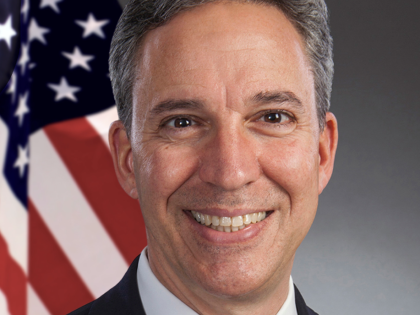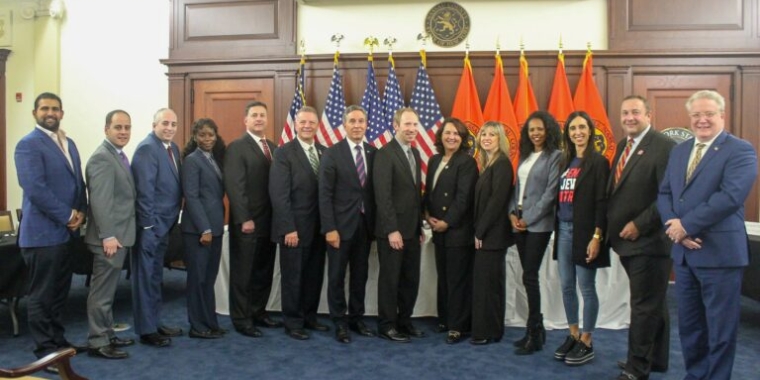
State senators hosts domestic violence awareness panel
October is domestic violence awareness month, and state senators in Nassau County teamed up to host an informative program last week with The Safe Center LI. The center, located in Bethpage, is the only agency in the county that provides comprehensive services to victims of domestic violence, as well as a plethora of additional services related to housing, food insecurity, child abuse and more.
The Safe Center LI is within State Sen. Steve Rhoads’ district, who also serves Bellmore, Merrick, East Meadow, Wantagh and Seaford. He was joined by State Sen. Jack Martins at the East Meadow Public Library. Joining the senators was Jennifer Rowland, the director of education at The Safe Center. Rhoads also partnered with fellow senators Patricia Canzoneri-Fitzpatrick and Alexis Weik to host the discussion.
“It’s about getting information out,” Martins said, “and making sure there’s a safe place in Nassau County.”
“What really makes this safe center such a unique place, and such a wonderful place for children and families, men and women, people with disabilities, people that are in the LGBTQIA+ community — we help all people,” Rowland said. “Whether they identify as victims or survivors, they can come to us and we can give them resources. If we don’t have resources on hand, which I couldn’t see how we couldn’t have resources on hand with everything that we do, but we can provide resources.”
Everything at The Safe Center LI is under one roof. Whether someone is in need of housing, food, police intervention, medical attention, and more, all these services are available at one location. The center is led by paid employees, but also volunteers, who help guide people through difficult times, and work with them to find solutions for issues they’re facing. It offers assistance to everyone, regardless of their location in the county.
“And that’s on the intake side,” Martins said. “And on the community outreach side, meeting with teenagers in their schools, the skills and resources they’re provided with are hopefully the tools they need to stay safe. But if they do get involved in one of these situations, they know that there’s a safe place that they can reach out to.”
Rowland said in her role, she’s essentially the community outreach program coordinator. The center offers educational programs for children in kindergarten through college, as well as programs for teachers, Parent Teacher Associations, community members and school officials — so they’re trained to recognize when a child may be in an abusive or neglectful situation at home.
“It’s got to be one of the most vulnerable times,” Rhoads said. “With the fact that people are home, especially during the pandemic, our home is our safe space. It’s a place where we can feel comfortable. But what happens if your safe space, the one place where you’re safe, is probably the least safe place that you can be?”
Rowland pointed out that just two weeks ago, everyone received an emergency alert on their phone, a test from the U.S. government, to ensure the system was working. Often, people in abusive situations may have a safe phone — that an abusive person doesn’t know about — and it could potentially be life threatening, when a secret phone goes off. She said The Safe Center operates a 24-hour hotline where trained staff members are there to assist, in every situation.
Rowland said according to the Centers for Disease Control, 61 million women and 53 million men have experienced psychological aggression in relationships, and 41 percent of women and 26 percent of men reported experiencing contact sexual violence or physical aggression from an intimate partner.
The Safe Center LI also provides statistics of people more likely to be in abusive situations, including woman of color, and males who identify as LGBTQ+. Many don’t report abuse, Rowland said, and statistics — while helpful, are likely unrepresentative.
But, Rowland emphasized, that’s why The Safe Center exists. If people are not fully out in their community, or not comfortable speaking about what’s happening to them because of cultural biases, the center will still help them.
What’s crucial, she said, is letting the victim or survivor know that they’re in control of their situation.
“When you ask the victim, or the survivor, what would you like to do about this situation, you’re empowering them,” Rowland said. “And if they decide to stay, if they decide to leave, no right or wrong answer, all you need to do is provide resources, the support, and safety plan. That’s really the most important thing.”
Rowland added that the center could benefit from more volunteers, even people who just want to work at the Island Harvest Food Bank, , a leading hunger relief organization. She added that the center’s counseling services are critical, for victims of partner violence, sexual assault, human trafficking, child abuse and more.
“We do some of the toughest work,” she said. “And we love it.”
The Safe Center LI is at 15 Grumman Road West in Bethpage. Call (516) 542-0404 for the 24-hour hotline, and visit TSCLI.org for more information, and a comprehensive explanation of services.
